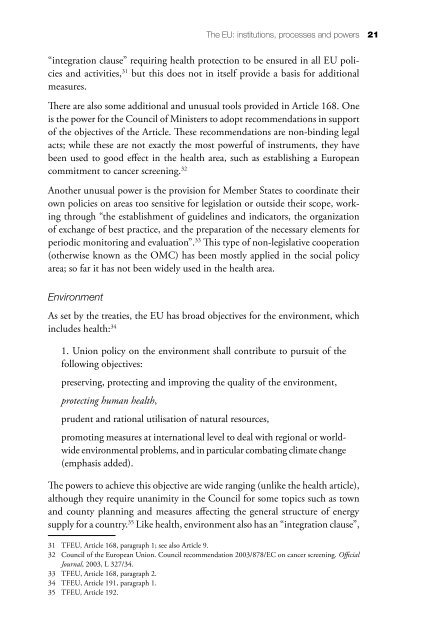Everything-you-always-wanted-to-know-about-European-Union-health-policies-but-were-afraid-to-ask
Everything-you-always-wanted-to-know-about-European-Union-health-policies-but-were-afraid-to-ask
Everything-you-always-wanted-to-know-about-European-Union-health-policies-but-were-afraid-to-ask
Create successful ePaper yourself
Turn your PDF publications into a flip-book with our unique Google optimized e-Paper software.
The EU: institutions, processes and powers 21<br />
“integration clause” requiring <strong>health</strong> protection <strong>to</strong> be ensured in all EU <strong>policies</strong><br />
and activities, 31 <strong>but</strong> this does not in itself provide a basis for additional<br />
measures.<br />
There are also some additional and unusual <strong>to</strong>ols provided in Article 168. One<br />
is the power for the Council of Ministers <strong>to</strong> adopt recommendations in support<br />
of the objectives of the Article. These recommendations are non-binding legal<br />
acts; while these are not exactly the most powerful of instruments, they have<br />
been used <strong>to</strong> good effect in the <strong>health</strong> area, such as establishing a <strong>European</strong><br />
commitment <strong>to</strong> cancer screening. 32<br />
Another unusual power is the provision for Member States <strong>to</strong> coordinate their<br />
own <strong>policies</strong> on areas <strong>to</strong>o sensitive for legislation or outside their scope, working<br />
through “the establishment of guidelines and indica<strong>to</strong>rs, the organization<br />
of exchange of best practice, and the preparation of the necessary elements for<br />
periodic moni<strong>to</strong>ring and evaluation”. 33 This type of non-legislative cooperation<br />
(otherwise <strong>know</strong>n as the OMC) has been mostly applied in the social policy<br />
area; so far it has not been widely used in the <strong>health</strong> area.<br />
Environment<br />
As set by the treaties, the EU has broad objectives for the environment, which<br />
includes <strong>health</strong>: 34<br />
1. <strong>Union</strong> policy on the environment shall contri<strong>but</strong>e <strong>to</strong> pursuit of the<br />
following objectives:<br />
preserving, protecting and improving the quality of the environment,<br />
protecting human <strong>health</strong>,<br />
prudent and rational utilisation of natural resources,<br />
promoting measures at international level <strong>to</strong> deal with regional or worldwide<br />
environmental problems, and in particular combating climate change<br />
(emphasis added).<br />
The powers <strong>to</strong> achieve this objective are wide ranging (unlike the <strong>health</strong> article),<br />
although they require unanimity in the Council for some <strong>to</strong>pics such as <strong>to</strong>wn<br />
and county planning and measures affecting the general structure of energy<br />
supply for a country. 35 Like <strong>health</strong>, environment also has an “integration clause”,<br />
31 TFEU, Article 168, paragraph 1; see also Article 9.<br />
32 Council of the <strong>European</strong> <strong>Union</strong>. Council recommendation 2003/878/EC on cancer screening. Official<br />
Journal, 2003, L 327/34.<br />
33 TFEU, Article 168, paragraph 2.<br />
34 TFEU, Article 191, paragraph 1.<br />
35 TFEU, Article 192.



